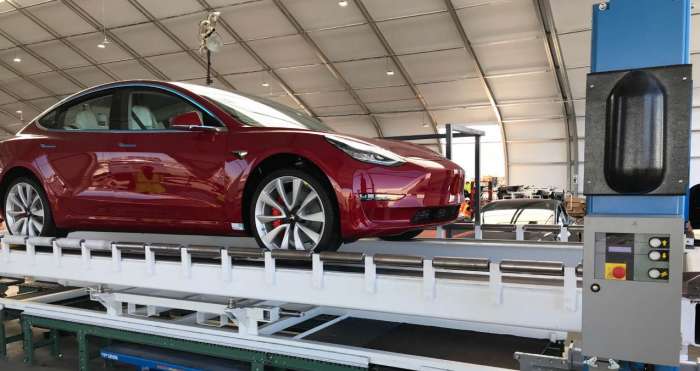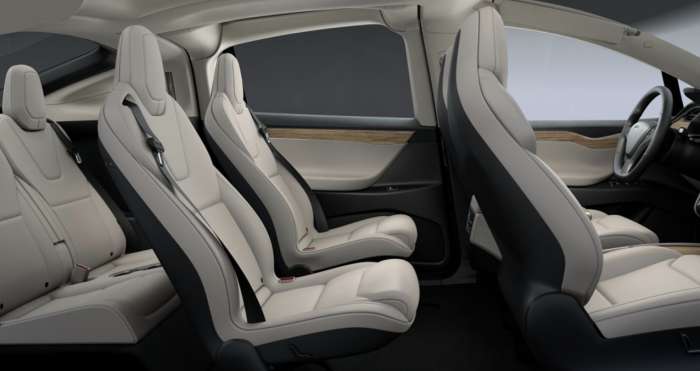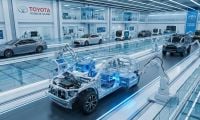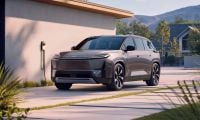Tesla is a polarizing company. As someone who has followed the development of electric cars with a bent toward favoring new, efficient technology, Tesla seems tailor-made for praise. Friends, followers, fans, and commenters alike - but especially commenters - ask often how great the latest model is, and should they buy it.
And almost as often, they’re disappointed in the answer: It is great, but probably not.
Not only are they disappointed, these friends, who are often electric-car fans and early adopters, are often angry and bewildered. How can a journalist who has invested 25 years in learning and writing about electric cars not favor products of an automaker who, by dint of outselling every other maker of electric cars, has done more for their success than any other company in history?

It’s a fair question, and one that seemed worth answering here for those who remain confused.
It’s a question of trust. I have no argument that Tesla builds some great cars. The Tesla Model S famously broke Consumer Reports’s ratings scale when it was first tested. The latest versions gets the equivalent of 111 mpg and has a range of 373 miles. That’s 125 miles more than most other “long-range” EVs, or more additional miles than the total range of a Fiat 500e.
The company’s popular Model 3 is nearly as nice, but doesn’t cost nearly the $100,000 out-the-door price of a Model S. What’s not to like?
As a company, Tesla is the only automaker ever to make a profit building electric cars, posting more than $900 million of profit in the last quarter of 2019 (though it has yet to post a profit for an entire year, and over its lifetime has still bled red ink overall.
EV fans can hardly be blamed for wanting the company to succeed. As an increasingly important American employer and Automaker, so do I. Strongly!
When it comes to carbuying advice though, it’s all about trust. Cars remain the second biggest expenditure just about every American household makes, especially for a car as expensive as Teslas. As such, making the wrong decision on a car can be financially catastrophic. (Take it from me and almost any of the hundreds of car writer’s I know who have owned many multiples of the number of old wrecks that an average American family does. We speak from painful experience.)
Just as you wouldn’t take out insurance or a mortgage from a company you didn’t trust, or buy an airline ticket on an airline you didn’t trust, it’s inadvisable to buy a car from an automaker that hasn’t demonstrated trustworthiness.
Brands exist to convey trust, and through its history, Tesla’s management has consistently demonstrated its untrustworthiness, both in its products, and its culture.
Many stock analysts routinely castigate Tesla and its CEO Elon Musk for missing self-imposed product’ announcement deadlines. That’s not what I’m talking about. Fans are right that Musk has consistently followed through with promised innovations that other automakers have failed to make. If he’s often months or sometimes years late, a certain amount of forbearance seems justified in developing a whole new technology and figuring out how to sell it. (Perhaps Apple founder Steve Jobs was more prescient in his famous secrecy.)
But in other ways Musk has squandered trust that fans would have liked to have in the company. Beyond the missed deadlines:
There was the Model X. Despite the fact that Tesla’s SUV is based on the Model S chassis that Tesla had already put into production, the Model X debuted more than a year late after technical development problems with its “falcon wing” doors and its new Star Trek rear seating system. Even then, the Model X had so many problems, especially with the doors, that it scored much worse than average in Consumer Reports reliability ratings and got poor scores in other reliability surveys. The problem is, no customers were asking for falcon wing doors even if they had been reliable or for second-row seats in an SUV that didn’t fold down. Both (along with the wrapover windshield and its attendant barely functional cicada-wing sunvisors), were pure hubris, costing long-term owners unexpected money in repairs in return for compromising the SUV’s usefulness. It would be hard to recommend to a friend or fan that they subject themselves to that experience in such an important purchase. The resulting low sales of the Model X put Tesla in a financial bind that almost killed the company by delaying its most financially-important product, the Model 3.
The Model 3 initially had other problems, too. I am not talking about its early flaky infotainment screen. That could befall many companies. As delays built on the Model X, Musk saw the need to save money and accelerate production of the Model 3 to fill the company’s financial hole. To compensate, he devised the world’s most automated car assembly line, with 30 percent the number of human workers per car that other factories use. The automated assembly line, rejected by other automakers for decades, proved an even bigger problem than the Model X engineering hubris. It delayed, somewhat predictably, the production of the company’s financial savior and again left Tesla with, in Musk’s own estimation, less than 10 months to survive.
The biggest problem comes down to Tesla’s survival. When purchasing a car, or really any manufactured mechanical product, consumers depend on warranties to reduce their financial risk in case anything goes wrong. At the same time Tesla was demonstrating with the Model X and with early Model 3s that things can and would go wrong with its cars, it was also demonstrating, repeatedly, that it might not survive long enough to make good on its cars’ 4-year/50,000 mile warranties. It might not las 10 months. That could leave buyers on the hook for tens of thousands of dollars of repairs early in the life of a very expensive product, in this case using new technology that no one else built, rather than off-the-shelf parts available from any auto supplier. No one wants to get stuck with a $100,000 paperweight in their driveway, and few Americans have the skills to effect a home repair job on such high-tech machines. If Tesla failed, its owners could also be left without access to the company’s most important selling feature, the Supercharging network, and even while they were running, the cars would be confined to the same slow charging speeds as other electric cars.
The good news is, Tesla has survived the launch of the Model 3, and may have turned the corner financially. It is building more factories. Other networks are building more fast chargers. And the company’s next big product bet, the Model Y SUV, eschews such fanciful, difficult to build and use features as Falcon wing doors. The upcoming Semi and the second-generation Roadster look to have enthusiastic markets and big enough markets and revenue to justify their development. The Cybertruck seems still full of hubris.

Now, if someone asks if they should buy a Tesla, the answer is a qualified yes—as long as it’s not the Model X or the Pickup. It seems much more likely that the company can continue to deliver on its promises—at least most of them—than it ever did before.
Tesla has now become a mainstream car company, but still has a huge lead in electric vehicles. See you in the second part of this story titled "Autopilot crashes erode faith in Tesla."
Eric Evarts has been bringing topical insight to readers on energy, the environment, technology, transportation, business, and consumer affairs for 25 years. He has spent most of that time in bustling newsrooms at The Christian Science Monitor and Consumer Reports, but his articles have appeared widely at outlets such as the journal Nature Outlook, Cars.com, US News & World Report, AAA, and TheWirecutter.com and Alternet. He can tell readers how to get the best deal and avoid buying a lemon, whether it’s a used car or a bad mortgage. Along the way, he has driven more than 1,500 new cars of all types, but the most interesting ones are those that promise to reduce national dependence on oil, and those that improve the environment. At least compared to some old jalopy they might replace. Please, follow Evarts on Twitter, Facebook and Linkedin. All of Eric's reports can be found on Torque News Tesla page. Check back again and search for Torque News Tesla news for more Tesla news coverage.
Set as google preferred source












Comments
Your article is puzzling to
Permalink
Your article is puzzling to me. You list various milestones and achievements that Tesla accomplished, yet you count the struggles that Tesla had in growing their car company as various points of losing your trust? All automotive companies have times of struggle, and failed projects as they evolve and try and compete. Quite recently, Chrysler and GM both required federal bailouts to stay in business, and have rebounded. Those companies would have potentially left millions of buyers stranded with lame duck products if their companies had failed...but in the end they didn't. And similarly, the future has not looked better for Tesla than it is today, despite it's past struggles. So it is more valuable to look forward than behind. You may not like the styling, design, or the hype of the Cybertruck, but so far it is looking like it will be another success for Tesla. I would have also foregone the Falcon doors for the Model X, but otherwise it is a very impressive SUV, offering EV range (328 mi) and amazing performance (0-60 in 2.7 sec) that exceeds all of it's similarly priced European competition. And this year we will see the Model Y, which should extend the success of the Model 3 into their more affordable crossover market, providing much of what owners liked in the Model X, but at a far lower price. Tesla is a relatively new automobile manufacturer, and they needed to innovate, promote themselves, and take risks with their technology and products. Many other automakers do not take nearly that many technology, manufacturing and design risks, and you could interpret that as being trustworthy. But then again they are not the automakers that are disrupting the auto industry. Driving innovation and competition. It is far easier to stay on the proven path and not rock the boat. But then things rarely improve, which in my eyes is a worse failure that stretching to achieve lofty goals, and not being 100% successful along the way.
I totally agree with your
Permalink
In reply to Your article is puzzling to by DeanMcManis (not verified)
I totally agree with your assessments of Tesla's sucess. Despite its initial issues with production and quality its vehicles are an qualified success given its short overall company existence. I bought a 2019 Model X last June. I've driven top model German marks the last 25 years. I agree the"luxury" part on Teslas cars not up to par. But i again realize i bought a technological marvel and not just an automobile. So far I have not regretted my decision to purchase. It'll be up to Tesla to maintain that faith.
If GM had failed, there is
Permalink
In reply to Your article is puzzling to by DeanMcManis (not verified)
If GM had failed, there is still a robust parts supply chain and service network. If Tesla had failed, where would replacement parts have come from and who would have fixed your car? It is not a matter of Tesla having lost trust but rather that it had not previously earned trust, as least for most.
To be fair in your criticism
Permalink
To be fair in your criticism of Tesla, I like to see similar articles about these other American manufacturers; GM, Chrysler, Chevrolet, Dodge, and Ford.
Which car company has a
Permalink
Which car company has a better track record of delivering and supporting electric vehicles? Nissan? No.
GM? No.
No one else has even managed to have a supported EV model for an 8 year warranty period.
They all support 8-year/100
Permalink
In reply to Which car company has a by Freddy (not verified)
They all support 8-year/100,000 mile battery warranties. Nissan was the first to commit to specs for battery degradation for that warranty (by necessity, unfortunately.)
I think you have
Permalink
I think you have misunderstood something about the financial data.
You write: "s a company, Tesla is the only automaker ever to make a profit building electric cars, posting more than $900 million of profit in the last quarter of 2019 (though it has yet to post a profit for an entire year, and over its lifetime has still bled red ink overall. "
Tesla has never ever had a profitable fiscal year. Never ever.
Tesla has not yet releashed financial data for Q4 2019, so you must mean Q3
Tesla did post a profit in Q3, but less than 1/6th of what you wrote.
Tesla is ~$900M in the red YTD (including Q3)
Tesla will not be profitable this year either.
Tesla disappoints because our
Permalink
Tesla disappoints because our expectations have become very high and Tesla has not fully matured as a company. But I believe you are being unrealistic about Tesla's ability to survive. Elon would bankrupt himself and Space X before he would let Tesla go down. No other CEO would care that much for a companies survival. The market understands this as Tesla is now the largest American auto company by market cap. That is not a company that people are unsure will be here tomorrow. Further other companies would buy Tesla in a heartbeat if Tesla was faltering. No one wanted to buy GM or Ford when they were faltering.
As far as issues with their cars having problems... Can you tell me another auto company that 8n there history hasn't had serious issues with cars. Toyota had the self acceleration problem, Ford Explorer had some serious issues, VW outright lied about their vehicles emissions. So what is your yard stick for measuring Tesla?
Tesla had a lot to learn in
Permalink
Tesla had a lot to learn in the beginning and more still. The X:s doors were overly ambitious, but over time things improved. The 3's ramp up was very ambitious and over time things improved. The S and X both had battery issues and the early S had failed drive units. These were growing pains
If you want to know how much you can trust Tesla today look at the Y and the upcoming Cybertruck. Those vehicles will be much better than the past. Early adopters take risks, you can always wait and see before you spend.
Yes, Tesla has learned
Permalink
Yes, Tesla has learned lessons along the way, but it has still been slow. I'm actually reasonably confident that they can launch the Model Y relatively seamlessly, though it remains to be seen how smooth the rollout will be from the two new factories. I have no such faith in the Cybertruck, which violates every modern safety design parameter and gets away with it by being so heavy it skirts the law.
The latest 3-year reliability reports just came out from both JD Power and Consumer Reports. New Model Xs still have trouble with the doors. And 6 and 7 passenger versions still have no way to fold down the second-row seats for hauling cargo like any other SUV.
Yes, early adopters take risks. The people who come to me for advice buying cars are not wealthy enough to shoulder those risks, and that's my point. Tesla buyers are gonna buy Teslas. And that's fine. But that doesn't make them great cars for everybody else. At least not yet.
Anyone who is car shopping in
Permalink
Anyone who is car shopping in the price range should absolutely take a serious look at Tesla. I wholeheartedly believe that the Model 3 is pretty much the best value car on the market, electric or otherwise.
And I agree that this article is confusing. Tesla is an amazing company who makes amazing cars. Just do it